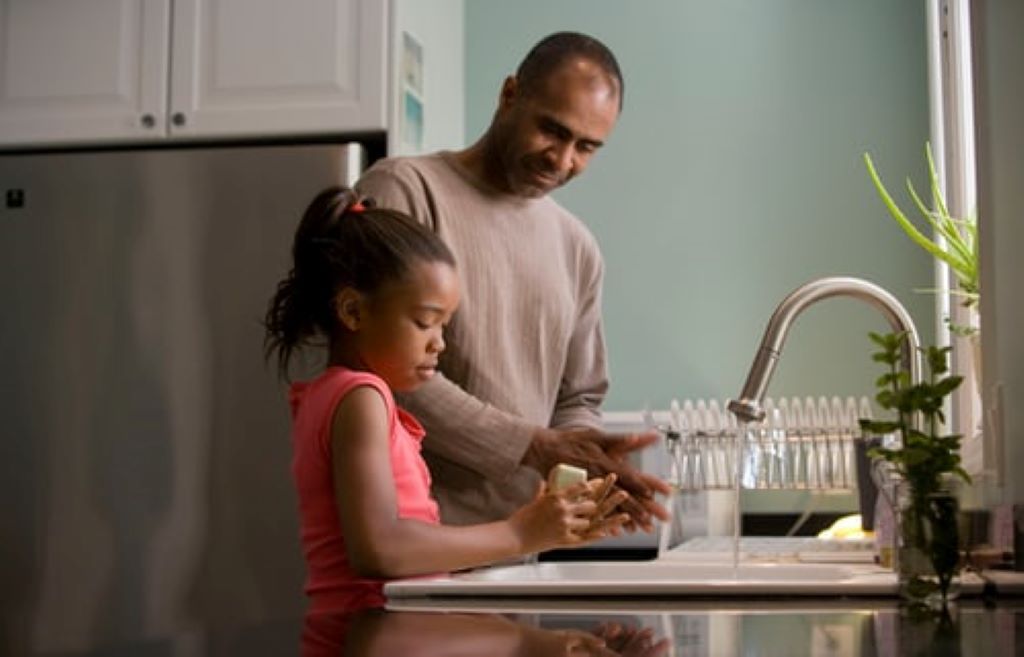How clean is too clean? The long term effects of reduced bacteria exposure and what to do about it

As the majority of the world continues to operate under some form of lockdown measures, governments and health organisations around the world have continued to iterate the same message: in order to control the spread of the virus, wash your hands, stay two metres apart from those outside your household and isolate if you present symptoms. The fear of contracting the virus has been widespread; the fear of bringing it into the home and passing it on to loved ones even more so.
With the possibility that, thanks to its resilience, COVID-19 could live on surfaces up to several days, the CDC (made up of the World Health Organisation and various other health authorities) have advised people to regularly disinfect any frequently touched surfaces, such as door bells and handles, light switches and kitchen worktops.
The problem with such widespread use of bacteria killing products is that they don’t discriminate between the harmful - such as COVID - and the helpful - all the natural good bacterias our bodies use to build their defence systems.
There have been suggestions that this newfound lack of exposure to natural germs and bacteria could, in turn, weaken our immune systems - a cruel irony in the face of a disease that thrives on such a thing. The question is, what risks does our increased use of these products pose to our health and what can we do to ensure they don’t cause any long term damage?
Why our bodies need bacteria
The microbiota that make up our bodies and the ways in which they affect our health has long been a topic of interest and fascination to the scientific community. Though research continues into the exact correlation between a healthy gut and factors such as brain function, susceptibility to disease and lasting health, there is something that all can agree on: humans need bacteria to survive.
“Our immune systems are hugely responsive, acting much like a sixth sense to anticipate our environment and prepare to respond appropriately,” explains Dr Jenna Macciochi, Author of Immunity: The Science of Staying Well and an Immunologist at the University of Sussex. “It is now clear that various environmental inputs educate and calibrate it, most notably the interactions between our immune system and the germs in our environment.”
The idea that trillions of bacteria are living on our skin, in our bodies, on every surface we touch and even in the air we breathe may alarm some people, but, as Dr Macciochi points out, “99% of them are harmless,” adding that “it’s these germs that are important for educating our immune system, particularly in childhood.”
In layman’s terms, the body hosts approximately 100 trillion ‘good bacteria’, with many of the residing inside the gut. These help our bodies to digest and absorb nutrients as well as process and produce many of the vitamins our bodies need to stay healthy. Evidence also suggests that good bacteria might also protect us from its more dangerous, disease carrying relatives by overpowering them in the gut, producing counteractions that stop them growing and triggering the immune system to defend against them.
As such, it is vital for both children and adults to gain exposure to these ‘good’ bacteria, in order to allow our bodies to process them.
The risks posed by cleaning products
As mentioned before, antibacterial cleaning products do not discriminate between ‘good’ and ‘bad’ bacteria, so by using them, we end up eliminating many of the ‘good’ bacteria from our home environments. Whilst it is, of course, necessary to keep clean and protect against harmful bacteria, particularly during the current pandemic, it remains important for us to interact with ‘good’ bacteria that can help keep our immune systems functioning well.
“Basic hygiene is important but having an extremely clean home particularly while living in a city may reduce the exposure to these good germs,” says Dr Macciochi. “I’d encourage people to practice good hygiene where appropriate and in context (such as washing hands after coming indoors and before cooking, cleaning kitchen surfaces after chopping raw meat) but use of harsh cleaning products is unnecessary and may erode the good bacteria on your skin which forms part of your immunity,” something, she warns, could be problematic in the long term.
What are the long term effects?
Research has suggested that the flu-like symptoms our body produces when it is working to prevent harmful bacteria and disease from entering the body is just one way our immune system works. The other is to continually work to defend the body through the regular exposure to less harmful bacteria - something that could explain why we are not constantly presenting with flu symptoms every time our body comes into contact with a new bacteria type. Our bodies, suggests one article, work with bacteria in a kind of tug-of-war, so when there is no bacteria tugging at the other end of the rope, our bodies collapse from the lack of tension, developing long term autoimmune issues such as asthma, inflammatory bowel syndrome, arthritis and type 1 diabetes.
How to protect ourselves
Dr Macciochi stresses the importance of interacting with good germs in natural environments and “spending more time in nature.” Not only will this boost your mental health, the exposure to various bacteria in the environment and Vitamin D from the sun will work together to support your immune system.
Whilst it is of utmost importance to remain vigilant with our efforts to reduce the risk of contracting COVID-19 through the suggested practices of hand-washing, cleaning and limited contact, we can still help our immune systems get the exposure they need to less harmful bacteria by eating a varied and healthy diet, having contact with furry animals like cats and dogs, and enjoying more time in the great outdoors.
If you enjoyed reading this article, you might like The best vitamins for your immune system




